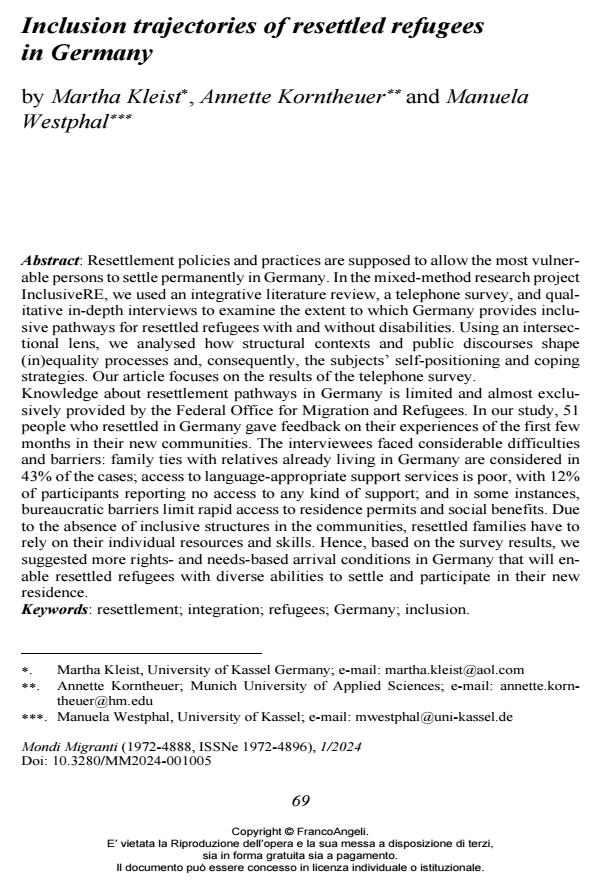Inclusion trajectories of resettled refugees in Germany
Titolo Rivista MONDI MIGRANTI
Autori/Curatori Martha Kleist, Annette Korntheuer, Manuela Westphal
Anno di pubblicazione 2024 Fascicolo 2024/1
Lingua Inglese Numero pagine 16 P. 69-84 Dimensione file 200 KB
DOI 10.3280/MM2024-001005
Il DOI è il codice a barre della proprietà intellettuale: per saperne di più
clicca qui
Qui sotto puoi vedere in anteprima la prima pagina di questo articolo.
Se questo articolo ti interessa, lo puoi acquistare (e scaricare in formato pdf) seguendo le facili indicazioni per acquistare il download credit. Acquista Download Credits per scaricare questo Articolo in formato PDF

FrancoAngeli è membro della Publishers International Linking Association, Inc (PILA), associazione indipendente e non profit per facilitare (attraverso i servizi tecnologici implementati da CrossRef.org) l’accesso degli studiosi ai contenuti digitali nelle pubblicazioni professionali e scientifiche.
Resettlement policies and practices are supposed to allow the most vulnerable per-sons to settle permanently in Germany. In the mixed-method research project In-clusiveRE, we used an integrative literature review, a telephone survey, and quali-tative in-depth interviews to examine the extent to which Germany provides inclu-sive pathways for resettled refugees with and without disabilities. Using an intersec-tional lens, we analysed how structural contexts and public discourses shape (in)equality processes and, consequently, the subjects’ self-positioning and coping strategies. Our article focuses on the results of the telephone survey. Knowledge about resettlement pathways in Germany is limited and almost exclu-sively provided by the Federal Office for Migration and Refugees. In our study, 51 people who resettled in Germany gave feedback on their experiences of the first few months in their new communities. The interviewees faced considerable diffi-culties and barriers: family ties with relatives already living in Germany are consid-ered in 43% of the cases; access to language-appropriate support services is poor, with 12% of participants reporting no access to any kind of support; and in some instances, bureaucratic barriers limit rapid access to residence permits and social benefits. Due to the absence of inclusive structures in the communities, resettled families have to rely on their individual resources and skills. Hence, based on the survey results, we suggested more rights- and needs-based arrival conditions in Germany that will enable resettled refugees with diverse abilities to settle and par-ticipate in their new residence.
Le pratiche e le politiche del programma di reinsediamento dovrebbero consentire alle persone più vulnerabili di stabilirsi in modo permanente in Germania. Nel pro-getto di ricerca InclusiveRE, utilizziamo una revisione integrativa della letteratura, un'indagine telefonica e delle interviste qualitative per esaminare in che misura la Germania offre percorsi inclusivi alle persone con disabilità. In una prospettiva in-tersezionale, ci proponiamo di analizzare come i contesti strutturali e i discorsi pubblici influenzano i processi di (in)eguaglianza e, in conseguenza, l’auto-posizionamento dei soggetti e le loro strategie di adattamento. Il nostro articolo si concentra sui risultati dell'indagine telefonica. Le conoscenze sui percorsi di reinsediamento in Germania sono molto limitate e fornite quasi esclusivamente dall'Ufficio federale per la migrazione e i rifugiati (BAMF). Nel nostro studio, cinquantuno persone che sono state reinsediate in Germania hanno raccontato le loro esperienze dei primi mesi nelle loro nuove co-munità. Gli intervistati devono affrontare notevoli difficoltà e barriere: i legami familiari con i parenti che vivono già in Germania vengono presi in considerazione solo nel 43% dei casi; l'accesso a servizi di consulenza linguisticamente appropriati scarso e 12% dei partecipanti hanno dichiarato di non aver avuto accesso ad al-cun tipo di supporto; in alcuni casi, le barriere burocratiche limitano il rapido ac-cesso ai permessi di soggiorno e alle prestazioni sociali. In assenza di strutture in-clusive nelle comunità, le famiglie reinsediate devono fare affidamento sulle pro-prie risorse e competenze individuali. Sulla base dei risultati dell'indagine, sugge-riamo delle condizioni di arrivo in Germania più incentrate sui diritti e sui bisogni, e che consentano ai rifugiati con disablità di stabilirsi e partecipare alla loro nuovo comunità.
Parole chiave:reinsediamento, integrazione, rifugiati, Germania.
Martha Kleist, Annette Korntheuer, Manuela Westphal, Inclusion trajectories of resettled refugees in Germany in "MONDI MIGRANTI" 1/2024, pp 69-84, DOI: 10.3280/MM2024-001005